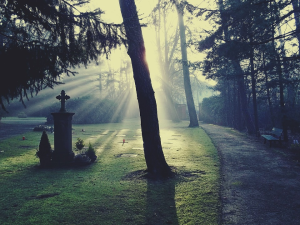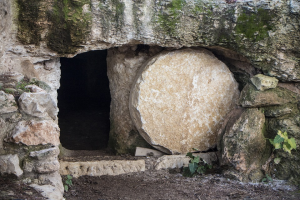There is a strange bias in the news toward reporting death. I suppose if we knew what lives were going to be led every time a child was born, perhaps we would be reporting births with the same degree of importance. The non-celebrities. The ones who would create beautiful things. The people who would overturn injustices. The little people who quietly get on with life and bless so many others in the process.
Dramatic and unexpected deaths hit headlines however, and we find ourselves chasing particular grisly stories for days, eager to learn more and get some degree of distant closure. Reflecting on mortality is to be avoided, but the details are often tantalising.
When we learn that a celebrity has died, we may gasp or feel the numbness of a missed beat; a little bit of our own history just died too. The death of Queen Elizabeth II recently winded a great many of us. Deaths of people we knew personally hit us the hardest of course, particularly those we loved. They will not see us again, and we will not see them. Our story must continue but the trajectory is changed now.

Stories are a huge part of how we make sense of the world, especially when death visits our world and alters our planned course. Some stories distil trauma so readers or listeners can relive the pain and fright. For many people, chasing these thrills and shocks enables them to feel more alive. For others, this too is senseless and harmful. What about light, and life, and hope?
We bring our cultural stories to our own understandings of death. I’ve become aware of more interest in popular culture in creating a fictional post-death world which is less unpalatable and grim.
I love watching the BBC series Ghosts, written by and starring the madly funny original cast of Horrible Histories. The premise is that ghosts from different eras linger for a period of time in the place where they died. It is made all the odder when a living person – after surviving a near death experience – discovers she can see and hear the ghosts who live in her historic home. Very witty writing and clever characterisation, although the plot is based more on very silly moments than a particular arc and resolution or philosophy. Death can be a great comedic device, but this doesn’t resolve anything – it just softens it.
Disney released the imaginative Pixar film Coco in 2017 about a boy who meets his dead relatives during the Day of the Dead and needs their help to return to the land of the living. Ultimately the message of this film is that being remembered is as important, if not more important than being alive. Death is not the end. But this implies that being forgotten is the end, which is a little unsettling. Not everyone will have a grand legacy.
Similarly, the 2020 Pixar film Soul explores the situation of a jazz pianist who dies suddenly and finds himself in a strange limbo setting. He tries to escape the tally and happens upon the place where new souls are born. It is all rather contrived, although the soundtrack is amazing. The main character has to undergo a personal transformation (in various ways, in fact) before he can make peace with what happens at the end of the film. Along the way his actions bring benefits to others. Death here explores redemption, both for the protagonist and those he meets. The details vary, but the pattern is recognisable as a story arc seen in many stories throughout history.
Maybe Disney and Pixar have an obsession with death. Apart from having characters die early in order to set the scene (Finding Nemo, Up, Frozen), there are films where characters need to connect with those who have died (Onward, Raya, The Lion King). Death is a useful gate, but also something universal; something we all need to talk about obliquely, to try and lessen its force.
Can we, though? However well we tell stories or compose soundtracks, death still has the power to kill and to separate.

Recently a lady at church died. Audrey used to keep ferrets and had a wonderful twinkle. I don’t believe she is in limbo, or a ghost. I do have reason to believe that I will meet her again one day, however.
On my social media I’ve learned of well-known Christians who have died recently. Brother Andrew, a man known for being extraordinarily ordinary and using this to smuggle many Bibles past the Iron Curtain. Jennifer Rees Larcome, who experienced real trauma and pain in her life, experienced a miraculous healing and had a powerful ministry encouraging others. Gordon Fee, who co-wrote the highly readable How to Read the Bible for All Its Worth and influenced so many in interpreting the Bible wisely and well. I have recommended his books to many students. I haven’t met any of these people myself.
Yet.
My story for understanding death is not based on unsubstantiated spooky or weird fantasies. I have a reason to have hope. My experiences of death have certainly involved loss and grief, but there is reason for real and genuine hope when someone with solid authority tells you about it.

For me, and for many others around the world, that authority rests with the author of life. The one who overcame death. One whose birth was announced (despite not being born to celebrity parents), and is still celebrated every year. Jesus, who came to overturn injustice one situation at a time, inviting others to follow him and meet hatred with love. Jesus, whose love breaks the power of fear. Jesus, who understands how difficult it is to be cut off from those we love, and chose the painful path to ensure that death is not the end; that redemption and reconciliation matter.
We don’t hear of every death in the news. We hardly hear any births, unless the circumstances are particularly unusual. But life is really all the stuff in between. At least, for now.
What stories do we tell ourselves when we consider the bigger picture, and what weight do these stories hold?
He has set a day when the entire human race will be judged and everything set right. And he has already appointed the judge, confirming him before everyone by raising him from the dead.
Acts 17:31
(The Message)
If you’ve not previously considered the message of hope and life that Jesus offers, I do urge you to look into it seriously. Read the gospel of Luke, and then Acts (the story of what happened next). Ask God to reveal himself to you if he’s real and to take away your fears. The author of life has a story for you to live, and I can promise you it won’t be boring!

Well said, Lucy, especially after all the nonsense of Halloween. Did you see my More Than Writers post on Halloween yesterday? It provoked a lively response.
LikeLike
Just read your article. We don’t celebrate Hallowe’en here, but we do give out sweets if anyone knocks (they don’t any more as we forget to put out a pumpkin most years!)
One thing I do try and use my skills for is in communicating how the churches together in our village work together to put on a Light Trail, like the events you talk about. Blessing people with light and hope (and a hot chocolate!) rather than judging them goes a long way to getting alongside folk. I want to talk about Jesus and light rather than even get into discussion about what Christians can or can’t do, so my method is to change the focus.
I also don’t want my kids dabbling with anything dangerous, so we talk about things and ensure they can use their minds to make choices with best possible consequences.
LikeLiked by 1 person
A Light Trail? What a good idea. I will suggest that at my church.
LikeLike